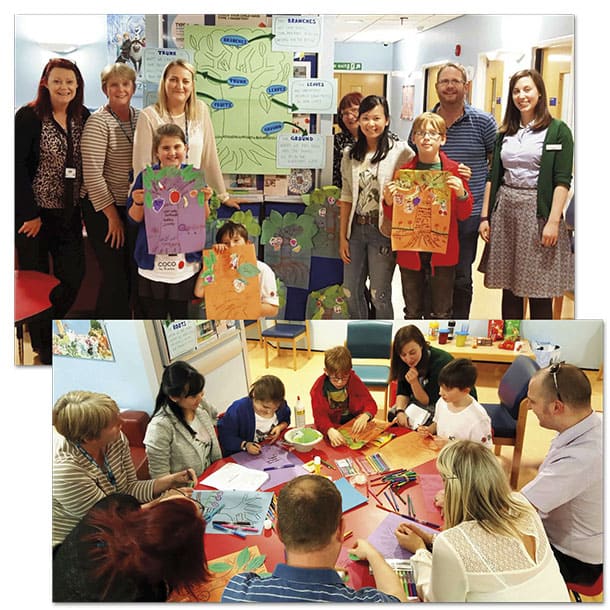Summary
This novel project started in 2014 working in collaboration with the clinical psychologists services training all diabetes team members in the SFBT (Solution Focused Brief Therapy) approach over 12 months. It works from the premise that the SFBT therapy should be a routine feature of the diabetes team’s care and viewed as more of a life coaching approach than a rescue for psychological problems. It sees children who have type 1 diabetes as just that, not a child who is diabetes.
Innovation
By focusing wholly on the diabetes, we as diabetes team members will continue to miss opportunities to see where children are showing their own resources which could be harnessed to manage their lives including their diabetes better. In addition, medical teams tend to use access to CAMHS when things are failing or options seem limited, or medical approaches are failing. The great benefit of Solution Focused Brief Therapy (SFBT) approach is its strengths-based approach, emphasising the resources that children and young people possess and how these can be applied to a positive change process. It works on the basis that the solution is not necessarily related to the problem. While not focusing on the problem, the SFBT approach looks at the exceptions, times when things were going well and what was happening then and works towards motivation in improving their control of their diabetes. Given its flexible, collaborative, strengths-focused approach, SFBT is likely to appeal to children’s services staff and diabetes teams.
Results
Significant quality improvements were seen in the national paediatric diabetes audit 15/16 which reported the unit’s HbA1c clinical outcome for 15/16 had a median of 7.8%, significantly better than the national average. The unit also had 34.2% of all our patients achieving HbA1c targets of less than 7.5%, significantly better than the national average. Our did-not-attend (DNA) rates reduced from 22% to 11 % (for under 10-year olds it was reduced to 5%) and hospital admissions due to diabetes length of stay reduced by 1.8 days. There is minimal cost to getting the team members trained in SFBT approach and the skills are life-long.
Dissemination and Sustainability
Research has shown that there is an association between psychosocial factors and metabolic control in a large international cohort of adolescents with type 1 diabetes mellitus (T1DM). The findings show that assessment of psychosocial factors should be an integral part of the paediatric diabetes care in this population. The team has been trained to undertake SFBT approach in our routine diabetes care and continue to receive supervision and update training on the SFBT approach. This project is reproducible anywhere as SFBT is a strengths-based approach, emphasising the resources that children and young people possess and how these can be applied to a positive change process. It works on the basis that the solution is not necessarily related to the problem. Given its flexible, collaborative, strengths’ focused approach, SFBT is likely to appeal to children’s services staff and diabetes teams and is easily reproducible anywhere.
Method
Early information and feedback from the carers’ and children and young adults with type 1 diabetes mellitus perspectives were obtained in 2014 using face-to-face meetings between the local diabetes team and the Southport, Formby & Ormskirk Children’s Diabetic Club and Parent support group ‘The Lancelots’, which is a registered charity affiliated to Diabetes UK. It was raised by the patients’ and carers’ representatives that, among adolescents and young adults, access to either CAMHS or psychologists was difficult unless there were more serious concerns. The service received 0.2WTE dedicated children’s diabetes psychologist time as part of best practice tariff. The patient and carer group welcomed the idea of Solution Focused Brief Therapy training of all diabetes team members and sessions delivered to the children to support well-being, education and improved glycaemic control. The diabetes team collaborated with Dr Dominic Bray, a Consultant Clinical Psychologist, and the founding Chair of the UKASFP (UK Association of Solution Focused Brief Practice), Dr Sharryn Gardner, who had developed a paediatric clinic-based solution-focused practice and trained with the SFBT BRIEF school in London, and our diabetes clinical psychologist Dr Becky Simm, who is an SFBT practitioner, to undertake SFBT approach in our routine diabetes care. The whole diabetes team was trained for six months, attending two 2-day workshops and had follow-up monthly SFBT training sessions in MDT meetings. All team members were also mentored and observed individually in clinics and given individual feedback on their SFBT approach and skills.




